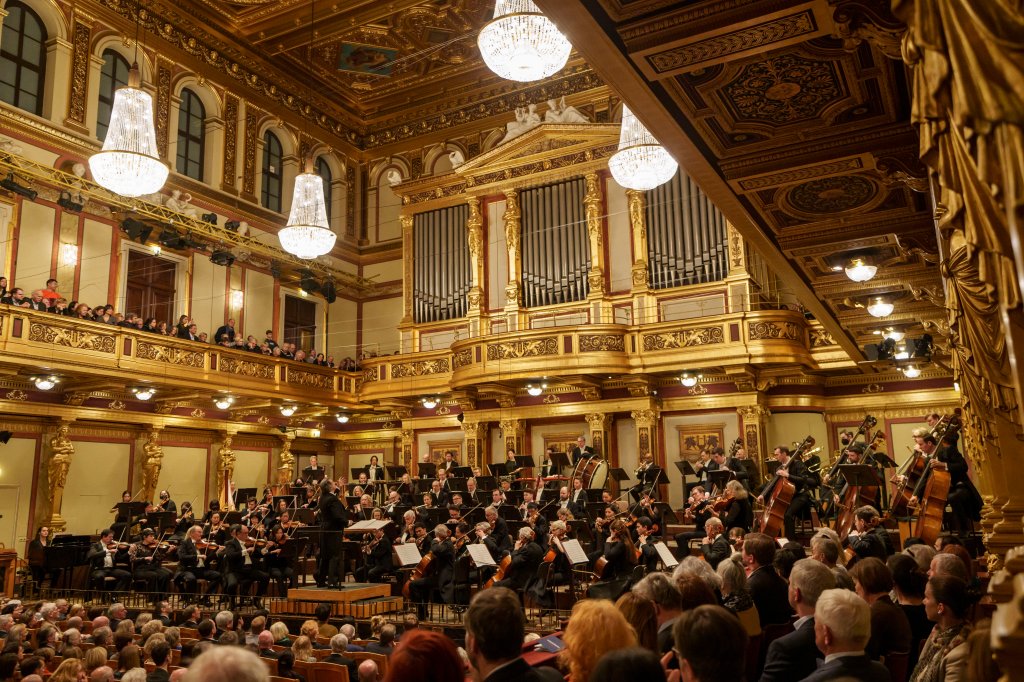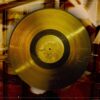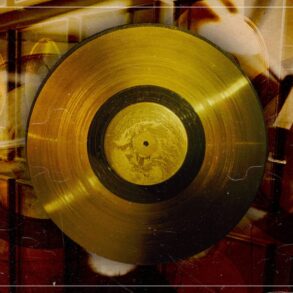
The Musikverein wasn’t everything Danny Jin expected. It was better.
Jin, 24, was appointed assistant principal second violin of the Chicago Symphony by music director emeritus Riccardo Muti fresh out of undergrad. He’s performed in Vienna once before, with the Curtis Institute of Music’s orchestra. But never here, in classical music’s most hallowed hall. Its sound, he says, is something he’ll never forget.
“The ringing aspect was what came to me first. Maestro (Muti) mentioned earlier that the fortes always have to be on a rounder side. You don’t need to be super direct or aggressive like you need to in some halls,” Jin said, speaking to the Tribune after a Jan. 22 rehearsal in the hall. “It’s like playing a very expensive instrument.”
Whether a first-timer like Jin or a veteran orchestra member, returning to Vienna’s Musikverein — the home of the Vienna Philharmonic, and where countless now-canonical works received their premiere — is a guaranteed high point for the CSO on its European tours. Their visits on Jan. 22 and 23 felt still more miraculous, a few short years after COVID stilled the performing arts world. The CSO hasn’t been to Europe since January 2020; in the uncertain seasons after the pandemic shutdown, the orchestra focused on touring North America.
On the CSO’s current European tour, the powers that be seem eager to make up for lost time. Between Jan. 11 and 29, the orchestra is scheduled to play 14 concerts across 11 cities and seven countries — easily its busiest tour in recent history. Its 1998 European tour with former music director Daniel Barenboim is a close second, with 13 concerts in eight cities over 17 days.
For Muti, the Musikverein is all but a second home. Since 2011, he has been an honorary member of the Gesellschaft für Musikfreunde, the storied organization that owns and operates the Musikverein building. The CSO’s most recent tour performances notched his 200th performance at the house since debuting there in 1973.
Muti returns in May to lead a bicentennial performance of Beethoven’s Ninth, at the Vienna Philharmonic’s invitation. If a greater honor exists in classical music, one is hard-pressed to find it. At both Musikverein concerts with the CSO, Muti was received like a matinee idol, the crowd’s applause surging every time he reappeared for a bow.
In Vienna, the city of music, small-world coincidences are nigh inevitable. On Jan. 23, four CSO strings gave a patrons-only performance of Beethoven’s String Quartet No. 4 at the former Lobkowitz Palace. The cozy, opulent Baroque room was the site of a premiere of some note by the same composer: a little ditty we call the “Eroica” symphony.
The day before, Marin Alsop, who leads the CSO in its summer residencies at Ravinia, surprised musicians by attending their Jan. 22 rehearsal and performance. She was in Vienna to lead a production of Bernstein’s “Candide” at the Theater an der Wien and a Jan. 24 Musikverein program of her own with the Vienna Radio Symphony, where she’s chief conductor.
The CSO’s tour repertoire, sourced from programming from the past two-and-a-half seasons, is just as demanding as its schedule. On any given evening, the orchestra could expect to play some combination of Philip Glass’s “The Triumph of the Octagon,” Florence Price’s Symphony No. 3, Mendelssohn’s “Italian” Symphony No. 4, Richard Strauss’s “Aus Italien,” Igor Stravinsky’s “Firebird” suite, Sergei Prokofiev’s Symphony No. 5 and Anatoly Liadov’s “The Enchanted Lake,” plus a Brahms 2 one-off in Frankfurt. As bookends, many concerts have also included one of two encores — the Intermezzo from “Manon Lescaut,” honoring the 100th anniversary of Puccini’s death, and Verdi’s “Giovanna d’Arco” — and the national anthems of host nations.
For both a Glass commission and Price symphony to make their way onto the tour list, much less make their Musikverein premieres, would have been unimaginable as recently as the last tour. Most attending the Jan. 22 and 23 concerts were old enough to remember when Glass’s music was booed at far less prestigious halls, and Price struggled to get her scores in front of professional orchestras after the CSO premiered her first symphony in 1933. But Muti’s affinity for both composers’ music has been one of the biggest curveballs of his final Chicago chapter.
“Obviously, these pieces mean a lot to Maestro Muti. But for us as Americans, it’s extremely important for us to represent our country’s great composers,” principal clarinetist Stephen Williamson said. “I never knew of Florence Price. I feel so grateful that, because of recent movements, we’re opening our eyes and ears to some of these incredible composers that weren’t given the opportunities they deserved.”
Over the CSO’s two Musikverein appearances, the gossamer dynamic effects of Glass’s “Triumph” fared better than Price’s thicket-dense symphony writing in the hall’s acoustics, with nothing to say of its more committed performance. Pianos devastated; fortes engulfed. That might surged back in double for a snarling Prokofiev 5 on Jan. 23. Transcending lackluster pilot performances back home, the CSO’s “Aus Italien” and “Firebird” crystallized nicely in their Vienna showings, crowning the orchestra’s two-day stay.
No matter how fast its clip, the CSO can’t outrun all the perils of life on the road. Williamson — recently back onstage after quadruple bypass surgery in September — and principal bassoonist Keith Buncke both fell ill during the orchestra’s stay in Vienna. While they stayed behind to convalesce, CSO colleagues (clarinetist John Bruce Yeh and bassoonist William Buchman) and guest musicians from the Vienna Philharmonic (clarinetist Matthias Schorn and contrabassoonist Benedikt Dinkhauser) filled in eloquently at the Vienna and Budapest concerts.
In the case of illness or other unexpected snafus, Guido Frackers is on musicians’ speed dial. Dutch-born and California-based, Frackers is the president of TravTours, a travel management consultancy specializing in symphony orchestra tours. The CSO was TravTours’ very first musical client, in 1976. Now, the company works with nearly 20 American ensembles, including the Boston Symphony, Cleveland Orchestra, New York Philharmonic, Philadelphia Orchestra, San Francisco Symphony and Los Angeles Philharmonic.
“There’s five of us in the team: two of us advance the hotels, one of us deals with the crew and their linguistic and practical needs, and two of us travel with the orchestra on a daily basis,” Frackers said. “From left to right, from top to bottom, everybody will need something at some point. My phone number is on every orange tour tag, and that phone can ring 24 hours a day.”
Amid the arrival of climate justice disruptions, long common in Europe’s fine arts space, to the U.S., Frackers and a CSO spokesperson noted that sustainability is increasingly becoming a more urgent logistical consideration. Those conversations are, for now, mostly happening behind the scenes: most orchestras’ collective bargaining agreements, including the CSO’s, limit how many hours a day can be devoted to travel, sometimes nixing more climate-friendly options like bus or train. And if a public mode of transit simply isn’t possible between cities, the orchestra must charter its own transportation — a significant added cost.
“I think we have to take a good look at ourselves and renegotiate our terms with the future of work. What are we willing to accept?” Frackers said. “Obviously, there has to be a balance, because the artistic integrity has to be guaranteed. I spoke to a colleague yesterday whose orchestra arrived in Vienna after leaving the hotel at six o’clock in the morning. They played a concert an hour outside Vienna, then the very next morning jumped on a train in Poland to play another concert. That’s not a way where artistic integrity can be guaranteed.”
With so many variables, a most welcome constant: unlike the U.S., where performing arts attendance still limps, the CSO has seen enthusiastic ticket sales at each of its tour stops. It played to capacity audiences not just in Vienna but in January stops in Brussels, Paris, Essen, Luxembourg and Budapest.
William Garfield Walker was among those filling out a packed Musikverein. For the American-born conductor, hearing the CSO on both Jan. 22 and 23 was a blast from the past. Walker attended Roosevelt University’s Chicago College of Performing Arts, where he studied with CSO cellist Richard Hirschl.
Today, Walker lives and works in Vienna, where he conducted what is believed to be the Austrian premiere of Price’s music — her “Adoration,” arranged for string orchestra — in July 2020. He noted the significance of bringing a symphony by Price, long overlooked by the classical music establishment, to classical music’s most mythic venue.
“The Chicago Symphony premiered her music. So, to hear them playing it here is something very special,” Walker said.
For Florian Karner, a Vienna resident who also attended both concerts, Price was a new name.
“I familiarized myself with her in preparation for the concert,” he told the Tribune after the Jan. 23 performance. “What an amazing life … It’s kind of sad that she didn’t get the recognition that she really deserved during her lifetime. And such luck that (many of) her pieces were found in her summer residence (in 2009, in downstate St. Anne, Illinois) — otherwise, perhaps she would be almost completely forgotten.”
Karner was also hearing the CSO live for the first time, though it was far from his first time in the Musikverein. His father, Dietrich Karner, is the Gesellschaft der Musikfreunde’s honorary president. The elder Karner and Muti, he said, had dinner plans together after the concert to welcome Vienna’s honorary son back home.
“(The orchestra is) distinctly American in sound. Yesterday, it was really interesting — at one point, they sounded almost jazzy,” Karner said. “I can’t wait to hear them again.”
This is the first of two stories covering the Chicago Symphony Orchestra’s 2024 European concert tour. Upcoming, a report from music director emeritus Riccardo Muti’s homecoming at La Scala in Milan, Italy.
Hannah Edgar is a freelance critic.
The Rubin Institute for Music Criticism helps fund our classical music coverage. The Chicago Tribune maintains editorial control over assignments and content.
This post was originally published on this site be sure to check out more of their content







